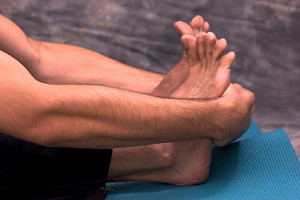
Signs of Poor Circulation in Your Feet
Monday, 05 June 2017 00:00 There are a variety of causes for poor circulation in the feet, and there are dangers that come along with having it as well. Your organs and extremities can be severely affected if there is a lack of blood supply to them. Fortunately, poor circulation may be improved through dietary modifications. One of the first signs of poor circulation that you will notice is constantly cold feet. This typically happens in the winter, when your oxygenated blood has trouble reaching your lower extremities. Swelling in the feet is also a common sign of poor circulation. This happens because your body retains water around the ankles as a response to the lack of blood. This symptom should not be ignored because it can be a sign of something much more serious.
There are a variety of causes for poor circulation in the feet, and there are dangers that come along with having it as well. Your organs and extremities can be severely affected if there is a lack of blood supply to them. Fortunately, poor circulation may be improved through dietary modifications. One of the first signs of poor circulation that you will notice is constantly cold feet. This typically happens in the winter, when your oxygenated blood has trouble reaching your lower extremities. Swelling in the feet is also a common sign of poor circulation. This happens because your body retains water around the ankles as a response to the lack of blood. This symptom should not be ignored because it can be a sign of something much more serious.
Poor circulation is a serious condition and needs immediate medical attention. If you have any concerns with poor circulation in your feet contact Dr. Randy Garr of Bigfoot Podiatry. Our doctor will treat your foot and ankle needs.
Poor Circulation in the Feet
Poor blood circulation in the feet and legs is can be caused by peripheral artery disease (PAD), which is the result of a buildup of plaque in the arteries.
Plaque buildup or atherosclerosis results from excess calcium and cholesterol in the bloodstream. This can restrict the amount of blood which can flow through the arteries. Poor blood circulation in the feet and legs are sometimes caused by inflammation in the blood vessels, known as vasculitis.
Causes
Lack of oxygen and oxygen from poor blood circulation restricts muscle growth and development. It can also cause:
- Muscle pain, stiffness, or weakness
- Numbness or cramping in the legs
- Skin discoloration
- Slower nail & hair growth
- Erectile dysfunction
Those who have diabetes or smoke are at greatest risk for poor circulation, as are those who are over 50. If you have poor circulation in the feet and legs it may be caused by PAD and is important to make changes to your lifestyle in order to reduce risk of getting a heart attack or stroke. Exercise and maintaining a healthy lifestyle will dramatically improve conditions.
As always, see a podiatrist as he or she will assist in finding a regimen that suits you. A podiatrist can also prescribe you any needed medication.
If you have any questions please feel free to contact our office located in Provo, UT . We offer the newest diagnostic and treatment technologies for all your foot and ankle needs.





